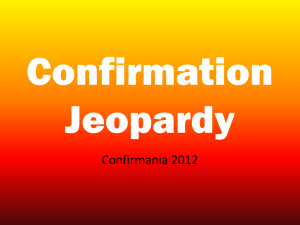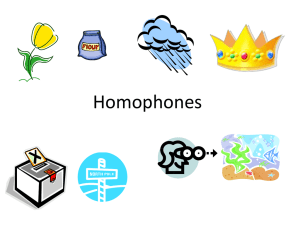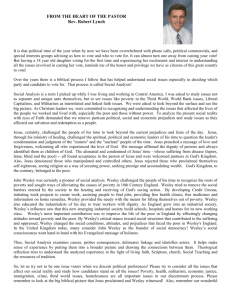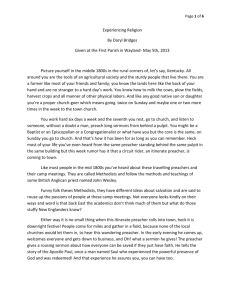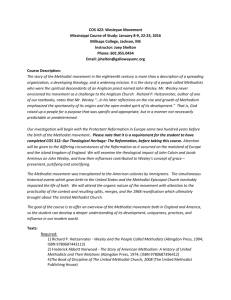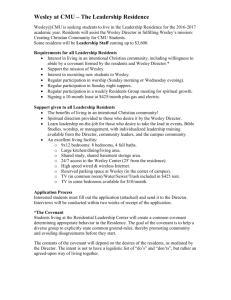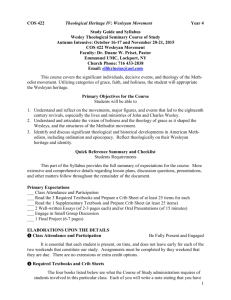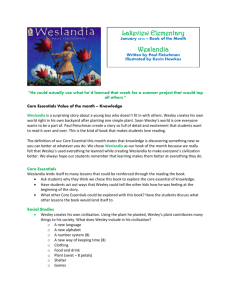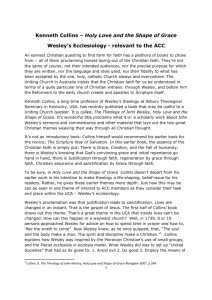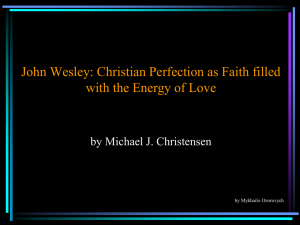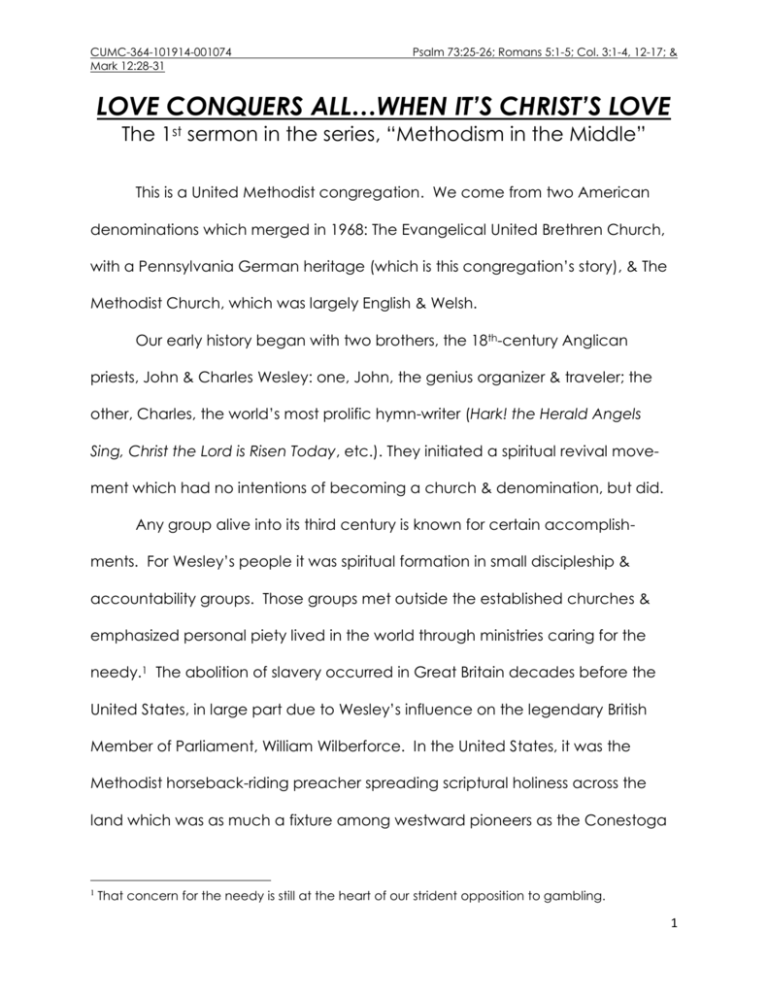
CUMC-364-101914-001074
Mark 12:28-31
Psalm 73:25-26; Romans 5:1-5; Col. 3:1-4, 12-17; &
LOVE CONQUERS ALL…WHEN IT’S CHRIST’S LOVE
The 1st sermon in the series, “Methodism in the Middle”
This is a United Methodist congregation. We come from two American
denominations which merged in 1968: The Evangelical United Brethren Church,
with a Pennsylvania German heritage (which is this congregation’s story), & The
Methodist Church, which was largely English & Welsh.
Our early history began with two brothers, the 18th-century Anglican
priests, John & Charles Wesley: one, John, the genius organizer & traveler; the
other, Charles, the world’s most prolific hymn-writer (Hark! the Herald Angels
Sing, Christ the Lord is Risen Today, etc.). They initiated a spiritual revival movement which had no intentions of becoming a church & denomination, but did.
Any group alive into its third century is known for certain accomplishments. For Wesley’s people it was spiritual formation in small discipleship &
accountability groups. Those groups met outside the established churches &
emphasized personal piety lived in the world through ministries caring for the
needy.1 The abolition of slavery occurred in Great Britain decades before the
United States, in large part due to Wesley’s influence on the legendary British
Member of Parliament, William Wilberforce. In the United States, it was the
Methodist horseback-riding preacher spreading scriptural holiness across the
land which was as much a fixture among westward pioneers as the Conestoga
1
That concern for the needy is still at the heart of our strident opposition to gambling.
1
CUMC-364-101914-001074
Mark 12:28-31
Psalm 73:25-26; Romans 5:1-5; Col. 3:1-4, 12-17; &
wagon. The brothers spawned not only the Methodists, but the Nazarenes, the
Wesleyan Church, the Salvation Army, the Assemblies of God, & a host of black
denominations, most notably the African Methodist Episcopal Church.2
That’s a 90-second, broad-brush introduction to us.
Many of you recall a bygone era when Christians knew what it meant to
be Catholic or Baptist or Pentecostal or any one of the large collections of
Jesus’ followers known as denominations. People hailing from those groups
relished their identity, knowing who they were & what they were about. They
proudly understood what made them distinct from one another.
Roman Catholics ate fish on Fridays, went to confession, celebrated mass
multiple times a week, & were given “last rights” at life’s end. Southern Baptists
quoted the King James Version of the Bible which they carried to church & got
dunked when they were baptized, but never as infants. Pentecostals were
disparagingly called “holy rollers,” because when “slain by the Spirit,” they
would literally roll around the floor during worship, prayed & sang & danced with
hands in the air, & spoke in unintelligible languages (tongues) at prayer
meetings. Nowadays, you can find contemporary praise song-singing Catholic
charismatics crossing themselves after being dunked in a river. Things are all
mixed up … to which I say, Amen!
To this list one should add The Evangelical Assn./Church, one of Christ Church’s predecessor
denominations. EC founder, the one-time Lutheran, Jacob Albright, was converted at a
Methodist revival, which in turn inspired Albright to found The Evangelical Association.
2
2
CUMC-364-101914-001074
Mark 12:28-31
Psalm 73:25-26; Romans 5:1-5; Col. 3:1-4, 12-17; &
About the only distinctive Christians we recognize in this age are the
Amish with their broad-brimmed black hats, beards, bonnets, & buggies. No
longer are we cradle-to-grave Episcopalians, Presbyterians, or Lutherans. We
change churches when we move, based on who has the better daycare, or
whose pastor isn’t too liberal or too conservative, depending on one’s personal
political preference. Does one’s denominational affiliation even matter,
anymore? Fewer & fewer persons can compare & contrast the variety of
Christians, even thinking that the world’s major religions are all the same: Hindu,
Buddhist, Jew, Christian, Sikh, Mormon, Muslim. “Eh, what’s the difference?”
Well, what’s a Methodist? Better yet, who is a Methodist?
“A Methodist is one who has ‘the love of God shed abroad in his heart by
the Holy Ghost given to him’ (Rom. 5:5); one who ‘loves the Lord her God with all
her heart, and with all her soul, and with all her mind, and with all her strength”
(Mk. 12:30).
God is the joy of one’s heart, & the desire of one’s soul; which is
constantly crying out, “Whom have I in heaven but you? and there is none upon
earth whom I desire beside you! My God & my all! You are the strength of my
heart & my portion forever” (Ps. 73:25-26).3 That’s a Methodist.
If that description sounds like it could pertain to anyone who sincerely
loves Jesus, you’re right. The man who said that about Methodists was John
Quotes altered to be gender inclusive. Although Jesus & Wesley were not speaking exclusively
to men & boys, the language of their day failed to reflect any inclusion of the female gender.
3
3
CUMC-364-101914-001074
Mark 12:28-31
Psalm 73:25-26; Romans 5:1-5; Col. 3:1-4, 12-17; &
Wesley in his brief tract, entitled, “The Character of a Methodist.” The love of
God & others, as Jesus said, was to be our hallmark.
Yes, Methodists were to believe the Bible is the inspired Word of God, not
just great literature produced by pious humans. It is “the only & sufficient rule
both of Christian faith & practice,” Wesley wrote.4 And Methodists were in
agreement with the Nicene & Apostles’ Creeds, those historical confessions of
faith of the church of Jesus Christ.
Methodists, however, did not have distinguishing marks, accents, words, or
phrases, nor any distinctive mode of dress. Quakers (think of the Quaker Oats
logo) & Mennonites in Wesley’s day had unique attire, as did Roman Catholic &
Presbyterian clergy. Methodists were plain-spoken, had no particular customs,
foods or beverages, & no different rules about marriage or singleness.
Father John famously stated, “As to all opinions that do not strike at the
root of Christianity, we think & let think.”5 He did not subscribe to an “anything
goes” theology. Neither did he get distracted by things that were at the
periphery of the faith. For example: in his “Letter to a Roman Catholic,” Wesley
made it clear where he disagreed with Roman Catholic doctrine, yet steadfastly
believed that his devoutly Catholic friend would join him in heaven someday.
(Most Christians at the time easily condemned to hell believers from other
denominations.) He took a stand, without standing above a fellow Christian.
4
5
John Wesley in his tract, “The Character of a Methodist,” 1743.
John Wesley in his sermon, “The Circumcision of the Heart,” 01 January 1773.
4
CUMC-364-101914-001074
Mark 12:28-31
Psalm 73:25-26; Romans 5:1-5; Col. 3:1-4, 12-17; &
Can we do likewise or must our “superior” stand become a point of division,
disdain, & denigration of brothers & sisters in the faith? Like Jesus, Wesley
preached & modelled love.
Let’s not be mistaken: Wesley’s day was not unlike our own in that there
were deep political divisions then, too. His own parents separated over politics,
namely their allegiance to the crown. Susanna, his mother, believed King James
II of England was unlawfully overthrown &, therefore, she would not pray for King
William III (of William & Mary fame). Samuel, her husband, as an Anglican priest
who took a vow to the monarch (no separation of church & state), upheld his
loyalty oath to King William.6
The conflict erupted into the open one day during the family prayers,
Samuel noticed that Susanna refused to utter “Amen” after a prayer for William
of Orange. Samuel was outraged. Alighting into considerable histrionics, he
reportedly said to his wife, “If that be the case, you & I must part; for if we have
two kings, we must have two beds.” He left for London, not returning until the
king died. Susanna remained in the parsonage at Epworth, Lincolnshire with
their six children.
Late in the summer when Samuel returned for a two-day visit to tie up
loose ends before leaving for good, the house was lit a-fire by a servant. Samuel
Chas. Phillips in “Royal Britain,” Wigston, Leicestershire, England: Anness Publishing Ltd., 2013, p.
172.
6
5
CUMC-364-101914-001074
Mark 12:28-31
Psalm 73:25-26; Romans 5:1-5; Col. 3:1-4, 12-17; &
was obliged to stay & take care of his family. Historians believe that John
Wesley was conceived that night.7
Divisions do heal. Indeed, “love conquers all” when it’s the love of Christ.
Little wonder that Wesley quoted Jesus when he said that a passionate love for
God & compassionate love for others is the heart of Methodism.
In the Name….
Copyright 2014 by G.D.Knerr at Lansdale, Pa. All rights reserved.
Stephen Tomkins in “John Wesley: A Biography,” Grand Rapids, MI: Wm. B. Eerdmans Pub. Co.,
2003, p. 10.
7
6

